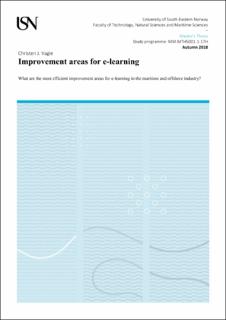| dc.description.abstract | E-learning is a different way of transferring knowledge in where the traditional
classroom has been replaced by a computer screen and the traditional instructor has
been replaced by plain text, often supported by voice, some video or various types of
animation. To achieve the full advantages of e-learning, the learning processes will often
be moved to a Learning Management System (LMS) software. This limits administration
and the learners may access the learning material individually, complete the learning at
their own pace and achieve recognition of completion. E-learning is used globally and is
accessible for all who have access and ability to use a computer device connected to a
network or where e-learning has been pre-installed. The purpose of this thesis is to
investigate the role of e-learning systems in facilitating knowledge transfer and explore
contingencies that may influence e-learning systems’ effectiveness. The data for the
thesis consists of an online survey issued to 1437 e-mail addresses of current e-learning
users connected to a large shipping company to which 154 responded (10,7%). The
results of the study point to several areas where e-learning efficiency can be improved.
In specific, more efforts should be placed on improving the assessment part. Courses
should be in the native languages of the learners. Alternative login methods to e-learning
LMS should be considered to remove the obstacle experienced by many in constantly
forgetting their user name and password. This could also mitigate fraudulent actions by
some. The results from this study can be used to improve both LMS functionality and elearning
processes. E-learning slogans suggesting that e-learning can reach “anyone,
anytime, from anywhere” should consider limitations to e-learning in the maritime and
offshore industry, such as access to internet and computers and various types of illiteracy,
be it computer illiteracy, reading illiteracy and visual illiteracy. Considering this makes elearning
an effective tool for knowledge transfer, not for all, but for “someone,
sometimes, from somewhere.” | en_US |
